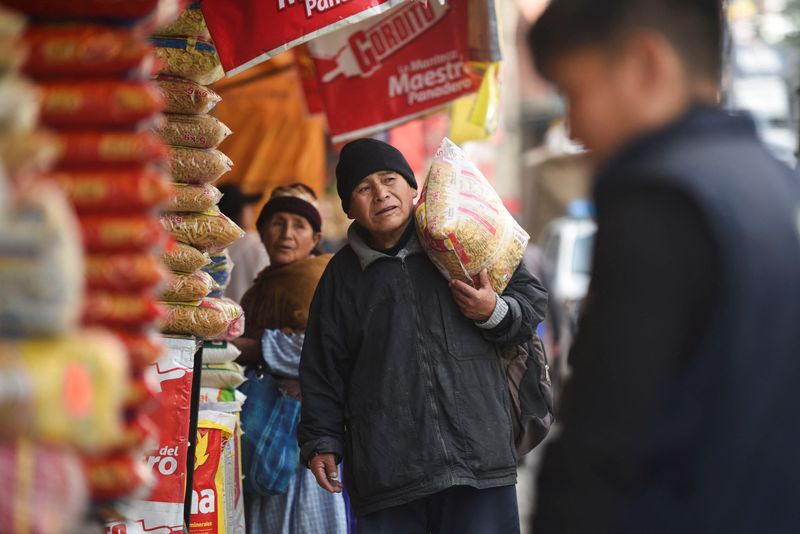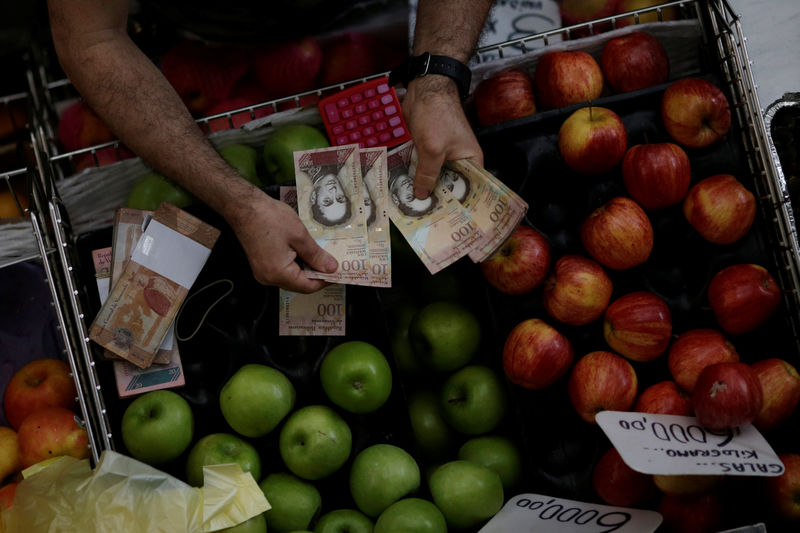By Monica Machicao
LA PAZ (Reuters) - Housewife Yola Chura worried about high food prices while shopping at a market in Bolivia's highland city of El Alto, where she and many others are struggling with rising prices, stagnant wages and a scarcity of dollars that has put the long-stable Andean economy on edge.
"We are in a total crisis. Salaries don't increase and so everything is expensive," Chura told Reuters at the market in the city that perches in the mountains above Bolivia's political capital La Paz. "With the excuse that there's no diesel or gasoline, the price of everything has gone up."
Inflation is its highest level in over a decade in Bolivia, which was heralded for its commodities-backed "economic miracle" in the 2000s. Now the country faces its worst economic crisis this century with natural gas exports tumbling while the dominant socialist party's spend-to-grow economic model has imploded.
Bolivia's gas exports, the key source of foreign income, have halved in the last decade as producers have not found new gas fields to replace those that have been tapped out. Central bank hard currency reserves have drained to nearly zero, which has hit imports of fuel, pushed up prices and strained the boliviano currency.
Frustrated motorists often wait in long lines for fuel. Wary investors have pushed bond yields up toward record highs.
A black market for dollars, common in crisis-hit neighbor Argentina, has grown in Bolivia for the first time in decades, with savers paying a 60% premium to the official exchange rate.
The economic slide has turned Bolivian politics nasty.
In June a military faction failed in a dramatic coup attempt. President Luis Arce is locked in a bitter fight with his powerful former ally and boss Evo Morales, who accused Arce of trying to kill him in late October.
Anger at the ruling party and in-fighting fueled a recent protest in La Paz.
"Where is the diesel, the fuel, the dollars?" farmer Margarita Llanque said at the march.
'FROM GAS TO DEBT'
Dollars have been getting scarcer for a decade, but the currency crisis exploded last year. Central bank data showed net foreign currency reserves are under $2 billion, down sharply from $15 billion in 2014. Most of the reserves are actually in gold, with liquid hard currency at just $121 million.
"Financial institutions don't have dollars," said local economic analyst Jaime Dunn. He blamed spending by socialist governments that have largely led the country this century, first under Morales and now former economy minister Arce.
Flagging gas exports were now making that spending unsustainable.
"Their model has now gone from gas to debt," Dunn said. "Default is a ghost that is circling Bolivia."
Bolivia's government says it will meet its debt payments. The Ministry of Economy says external debt stands at some $13 billion, equivalent to 27% of GDP. It plans to issue $3 billion of sovereign bonds next year to help meet its obligations.
The ministry declined a Reuters request for comment.
The dearth of reserves, however, has distorted the local currency that has been pegged to the U.S. dollar for years.
"Getting dollars is hard," said Arash Masoudi, citing restrictions put on paying overseas with Bolivian bank cards. "Cards won't accept purchases over $100... It's impossible to pay even if you have millions of bolivianos in your account."

The crisis has hit importers and companies operating in the market, including airlines. The International Air Transport Association (IATA) warned this month that airlines were facing increasing issues getting revenues out of Bolivia.
"There's a lack of dollars, of diesel and, if this continues, there will be a lack of food," said Jean Pierre Antelo, representative of CAINCO, a major business association in the country. "We need an economic rescue."
